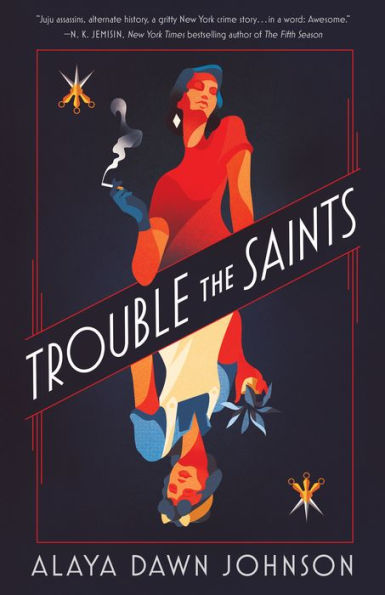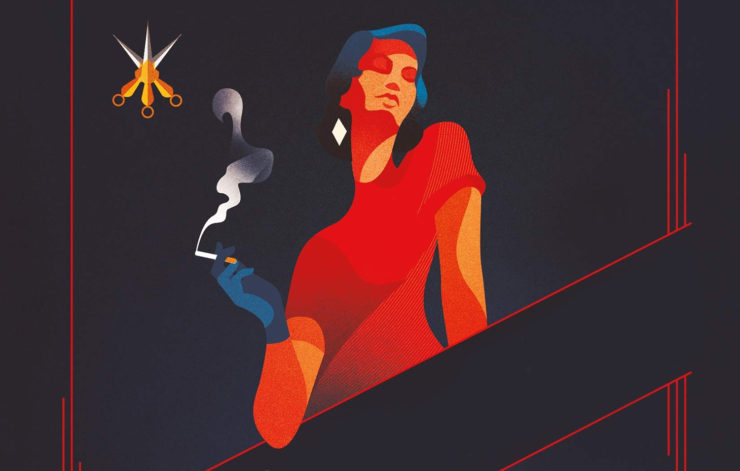I kept trying to write about alternate history, but the concept turned slippery and strange in my grasp. Alternate history, I thought, over and over, until it became six syllables in an arcane language, a mantra, a riddle. This is just your Covid brain, I thought. I told my editor I’d get it to her in a week. I told her that many weeks ago, and I’m still here, trying to figure out why what ought to be a simple sub-genre label has begun to strike me as a fundamental category error.
It invites a simple definition: alternate history is history that isn’t real. But how is it not real? It diverged from a specific point that we know to be real? It explores history? Or it explores the present through the lens of history? Why do we draw a line between those two things, “present” and “history,” as though there were some clear demarcation between them? If we are living downstream from history, then what is our relationship to imagined history? Is it the same as an imagined present? Are our alternate timelines running alongside us, tumbling forward in our collective memories, yearnings and resentments, constantly reflecting and forming counterpoint to our actual stream?
Here is an alternate history: the South won the war. Generations later, old white men making backroom deals over cigars and whisky salute “Mr. President” to a hagiographic portrait of Jefferson Davis, looking out regally across the proceedings. Enslaved descendants of the first people stolen from Africa continue to labor in the same cotton fields and corn plantations as their ancestors. Minor reforms are enacted: the enslaved people are given “wages,” all taken back in due time by the company store, with interest, and referred to in polite society as “sharecroppers”. A rebellion after the war by an alliance of free Blacks and progressive whites makes some gains, but is squashed with such brutality that its legacy haunts both North and South for generations. Despite more than a century of similar rebellions, met with similar brutality, in Louisiana the great-great grandchildren of the enslaved Africans who lost the war pick cotton if they’re unlucky and wait upon wealthy white landowners in the halls of the government if they’re lucky. They are not called “slaves” either, but “criminals” and “repeat offenders.” Robert E. Lee on Traveler still stands astride Monument Avenue in Richmond, Virginia, the old capital, reminding us all of what we could never forget anyway.
Funny, right? So funny, you forget to breathe. Right alongside us, this not-so-alternate history. Close enough to drown in.
Here is “real” history, the way I was taught in a private DC school, alongside the scions of our political class: the South lost the war. Lincoln, a great white man, freed all the slaves. Slavery was banned in the constitution (except for criminals, and who could object to that). The war was not fought for slavery or Black liberation in any case, but for the more high-minded principal of states’ rights. Nevertheless, federalism lost and after the failed experiment of reconstruction, waves of freed Blacks migrated north looking for better opportunities. They found them, but there was still a little bit of racism lingering here and there. After the civil rights movement of the sixties, though, that all went away, and any endemic inequalities suffered by the Black community in the United States since then are all the fault of a lack of personal responsibility, Welfare Queens, or just being Tragically Less Smart Than White People (it’s not phrenology, it’s Science!). Systems of oppression are a myth. “Racism” only counts if you use the n-word, and even then, only sometimes.
Maybe it’s my Covid brain, but it seems to me—it seems to me—
Who decides what’s “real” and what’s “alternate”? Real history often seemed wack to me, but I had to learn it anyway. If history is a story, with protagonists and themes and a destination, however nebulous, an arc which must bend gracefully to our present time, can’t it have a remix? Some fanfic? Five Things Thomas Jefferson Never Promised His Enslaved Children? What’s the story of what real history leaves out? Where’s the alt take? People say that history is written by the victors, but sometimes who wins, and along which axis, is a function revealed by time, not peace treaties. Sometimes, often, almost always, histories travel alongside one another in eerie parallel, one more accepted, or acceptable, than the other, but not necessarily more true.
Buy the Book


Trouble the Saints
Sometimes, as a Black writer, alternate history is just you in the mud, digging a trench between this common knowledge hellscape in which you’ve found yourself and the glimmering rivulet of another story you’ve always felt in your bones. Some of us were passed down the outlines of these other stories like family heirlooms. Some of us, like me, were indoctrinated into the mythology of our oppressors in the hope that it would spare us. It’s no wonder we’ve had to use some magic, some knowledge of and commentary on the present, some counterfactual details (that might not even be so counterfactual after all, considering the water you’ve been swimming in). That might make our histories “alternate” but it doesn’t make them wrong.
(I’m aware of the irony that many of the custodians of the most accepted stream of history enjoy styling themselves as “alt-” much in the same way that they enjoy using the language of the oppressed in order to shore up their own hegemony. Their “alternate” is not revolutionary, but reactionary; not a reality othered by the mainstream, but a deliberate falsehood trussed up, muzzled, deemed true enough until the next convenient “alt-fact” comes along. Their shell game has power because they are powerful, but it’s not particularly sophisticated.)
This is the hard work being done by brilliant contemporary writers like Nisi Shawl in Everfair, Kai Ashante Wilson in The Devil in America, Colson Whitehead in The Underground Railroad and The Intuitionist, and Victor LaValle in The Ballad of Black Tom (just to name a few).
We’re living through what I like to call a timeline shift—a sudden, dramatic change in what all of us had agreed was our present and future (and perhaps, even, our past). But we are not living through these seismic shifts equally. In the United States, a poor Black person isn’t living the same pandemic as a rich white one. Neither of them are living anywhere near the same pandemic as someone in New Zealand, or Vietnam, or Iceland. Is the pandemic year an unmitigated public health disaster with consequences for decades to come, or a tricky but thoroughly solvable public health problem? Depends, doesn’t it? Sometimes who you could have been is as important as who you were. Sometimes “coulda, woulda, shoulda” is the story that keeps us alive. When our present stories become history, whose will win out and become the accepted narrative? And if in fifty years, someone writes one of those other histories, the ones most people agreed to forget or decided were impossible, will it be “alternate”? Or will it just be, as it always was, the true history of a parallel stream?
Alaya Dawn Johnson has been recognized for her short fiction and YA novels, winning the 2015 Nebula Award for Best Novelette for “A Guide to the Fruits of Hawai’i,” which also appears in The Best American Science Fiction and Fantasy (2015), guest edited by Joe Hill. Her debut YA novel, The Summer Prince, was longlisted for the National Book Award for Young People’s Literature. Her follow up YA novel, Love Is the Drug, won the Andre Norton Award in 2015. A native of Washington, D.C., Johnson is currently based in Oaxaca, having finished her masters degree in Mesoamerican studies at Universidad Nacional Autónoma de México.










